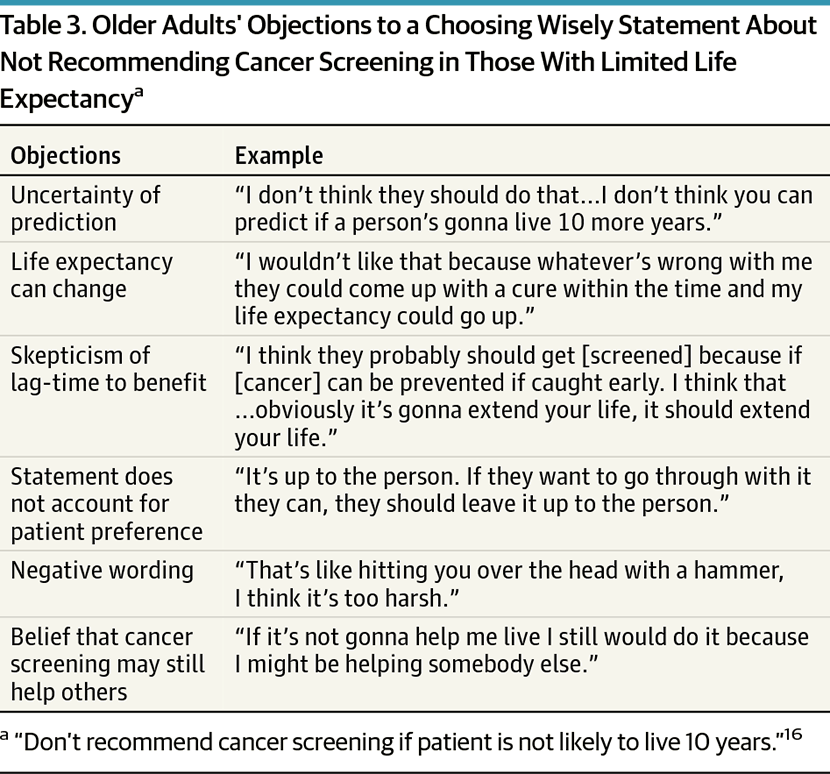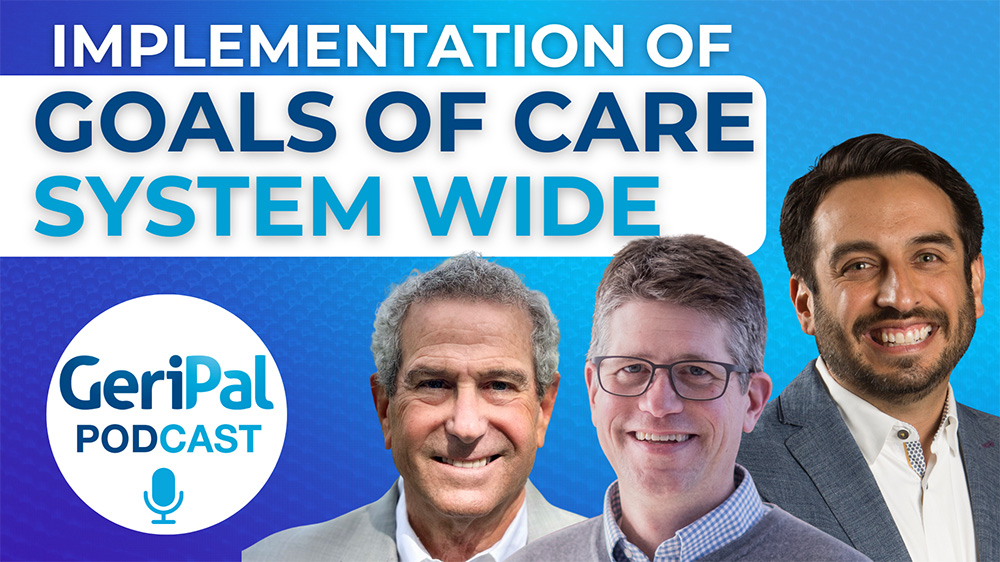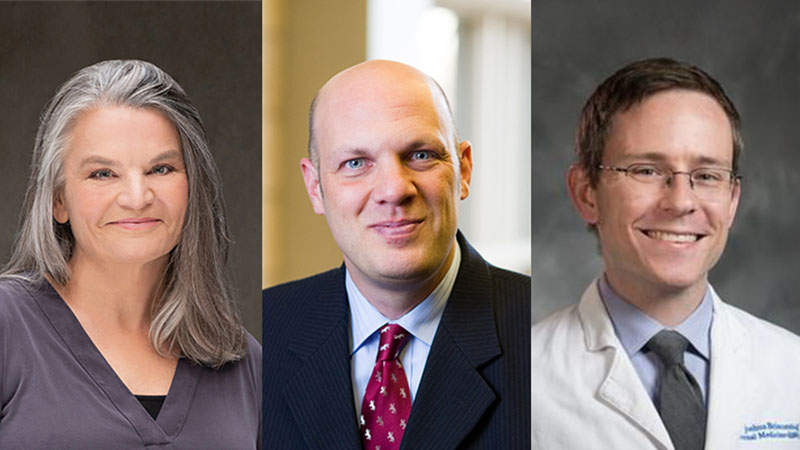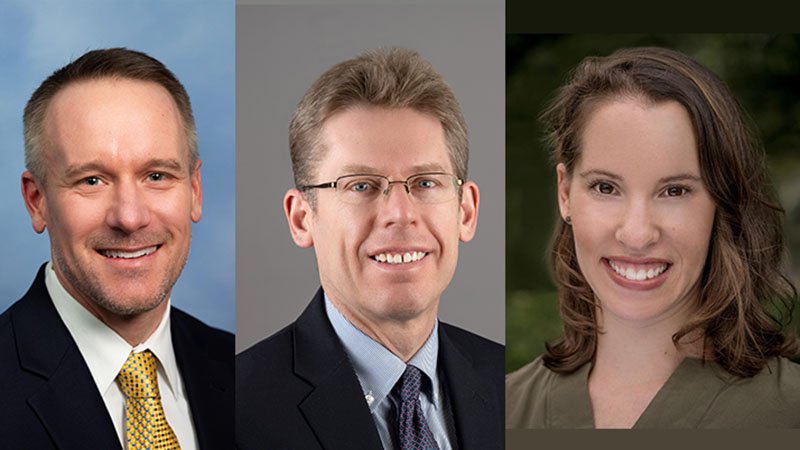
What should you say to your older patient when it’s time to stop cancer screening?
This week’s GeriPal Podcast features Nancy Shoenborn, Assistant Professor of Medicine at Johns Hopkins. Dr. Shoenborn published a paper in JAMA Internal Medicine this week on older adults perspectives on cancer screening cessation, and using life expectancy to justify stopping screening.
The graphic above gives some nice quotes of older adults in reaction to the Choosing Wisely Statement, “Don’t Recommend Cancer Screening if Patient is Not Likely to Live 10 Years.” 38/40 pariticipants in this study objected to this statement!
The majority of our discussion was focused on this puzzling set of facts:
- Older adults in this study were OK with clinicians advising them to stop cancer screening
- But most did NOT want clinicians to use Life Expectancy as a justification for stopping
Makes you think, huh? The major reason for stopping screening is because it’s unlikely to benefit more than harm over the course of the patient’s life time. But they don’t want to hear it that way.
The most acceptable phrase to participants was, “This test will not help you live longer.”
This makes intuitive sense, and is more of a positive framing about possibility of life extension than a statement about prognosis.
Enjoy! Transcript is below.
-Alex Smith, @AlexSmithMD
Links:
Eric: Welcome to the GeriPal Podcast, this is Eric Widera.
Alex: This is Alex Smith.
Eric: And Alex, who is our guest today?
Alex: Today we have Nancy Schoenborn, who is an assistant professor of medicine at Johns Hopkins. Welcome to the GeriPal Podcast.
Nancy: Thank you so much for having me, it’s a pleasure to be here.
Alex: Today we’re gonna talk to you about an article that you published in JAMA Internal Medicine on older adults’ views and communication preferences about cancer screening cessation. But before we do that we usually ask our guest to give us a song request. Do you have an artist or a song request Nancy?
Nancy: Anything Beatles.
Alex: Anything Beatles. We love the Beatles, we get a lot of Beatles requests, but we haven’t done this one yet. This is Obladi-Oblada.
Alex sings “Ob-La-Di, Ob-La-Da” by The Beatles.
Eric: Nice.
Alex: Brah.
Eric: Brah? What does brah… brother?
Alex: Brah?
Eric: So Nancy, you just had a publication in JAMA Internal Medicine and, Alex already mentioned it, it’s older adult’s views and communication preferences about cancer screening cessation. Before we talk about that article I was hoping just, how did you get interested in the subject?
Nancy: I have been interested in thinking about how to talk to older adults around the topic of life expectancy and how to incorporate that into decision making, and one of the very commonly relevant decision making areas is about cancer screening. So, that’s been the topic I’ve been thinking a lot about. We had a study about a year ago, also published in JEMA Internal Medicine, looking at providers’ perspective on this topic and so, this was a fun project where we got to ask how older adults think about it.
Alex: Interesting, can you tell us a little bit more about what the providers’ perspective was? Just to sort of, by way of setting up this current piece asking patients.
Nancy: Yeah, so we did an interview study of 28 premier care providers and asked them how they thought about life expectancy and how they thought about stopping cancer screening in older adults. And what they said was that they think about the older adults’ life expectancy quite common, but they were somewhat uncomfortable recommending that they stop cancer screening, even if they have a limited life expectancy. Often if the patient were relatively younger, the patient demanded continued screening they often gave in. That was one of the findings and they secondly they rarely verbalized their consideration about life expectancy to the patients. It was something they consider but didn’t really discuss explicitly with the patient.
Alex: That’s terrific so, help us set up the need for the current study. Why do we need to turn from the doctors’ perspectives to the older adults?
Nancy: It was actually a direct link. So one of the reasons the clinicians mentioned that they thought stopping screening was reasonable but, they didn’t actually put it into action because the patients wanted to continue screening and they were worried that the patients might react negatively if they recommended that they stop. So, we got that result and thought, “Well why not go to the patients and ask them what they think about these recommendations on using life expectancy to inform screening decisions.” So that’s the background of how I got interested in this project.
Alex: So tell us a little bit about what you did.
Nancy: So we interviewed 40 older adults living in the community. We recruited from four different clinical programs. Some were house-call programs where they were home bound. Some were patients where they were dual eligible older adults, and we really wanted to get a wide range of patients with a wide range of life expectancy. So some were ambulatory clinic patients where they were relatively younger and healthier, but we also tried really hard to get the older, the more functionally impaired participants as well, to get their views.
Alex: So, you had a diverse group of older adults. Diverse in terms of life expectancy, in terms of background. Tell us what you asked them.
Nancy: We asked them about two different areas. First we asked them how they thought about the decision to stop screening. So, would the ever consider that, and how they would react if their clinician recommended that to them. And secondly we asked about communication. So, what are some of the preferred ways for a clinician to recommend to patients to stop screening?
Alex: And what did you find in terms of the first issue? Is it all right for these folks if their docs recommend stopping screening?
Nancy: The short answer is yes. We found that many of our participants were very open to the idea of stopping screening. Some of them have already decided to stop and, the rest are very open and came up with scenarios in which they would consider stopping, and more importantly they were very positive towards such a recommendation. Especially if there was a trusting relationship. So they did not think negatively of their doctor or trust them any less if the doctor recommended to them that they stop screening. Even among the ones who would continue to screen, they did not think any less of the doctor for recommending that they stop.
Alex: That is interesting, especially since the doctors, as you said before, were reluctant to bring up stopping screening with their patients in part because they were worried it would jeopardize their relationship with their patients, is that right?
Nancy: That’s right. So I find that this result is really reassuring, is my hope, to the clinicians that, look if you have a good relationship where the patient already trusts you, having this recommendation come up really would not jeopardize that, according to what we found in this study.
Eric: And how do they feel about the concept of life expectancy?
Nancy: That was a little bit more tricky. So we found that the older adults thought using age, and using their health status and functional status to help make decisions about cancer screening was a great idea. They did not really make the connection that all those things were directly linked to life expectancy. So, when we showed them a recommendation using the specific term of life expectancy, they were, I would say more perplexed on where that came from, and didn’t really perceive a connection between life expectancy and cancer screening.
Eric: And you specifically used the choosing wisely statement, right? “Don’t recommend cancer screening if a patient is not likely to live ten years.” All but two did not like that statement, is that right?
Nancy: They did not like that statement, for a number of reasons. And I think it’s a very complex concept for them to understand. Some thought the idea of ten years is a very long time frame, so how can you predict that? Some thought it was a very definitive and didn’t really give any room to consider uncertainty. Some were really questioning this idea why you wouldn’t benefit right away from screening, and that it’s a delayed benefit, that was very confusing for them. Some thought the framing of that phrase was very negative, and so… but yes, you’re right. Throughout they didn’t really like that language.
Eric: And, correct me if I’m wrong, at the very beginning of the study, you actually told them that cancer screening takes ten years to benefit, in most cases, is that right?
Nancy: We gave them overview of why we do screening. We specifically say it takes up to ten years to benefit. So, if someone passes away before then, that person doesn’t get the benefit but could still be harmed. We say those specific words. But I think that shows us these are unfamiliar concepts to the public, and so even with a brief explanation, a lot of them still didn’t seem to wrap their heads around it towards the end of the interview.
Alex: So the unfamiliar concept is the lag time to benefit concept, or the life expectancy concept, what is unfamiliar?
Nancy: I would say both are unfamiliar to them. That age and health status and functional status are actually direct inputs we use to predict life expectancy, and the older adults thought each of them were very important cancer screening. But they did not make the connection that those are directly linked to how we estimate life expectancy, and they therefor did not think life expectancy itself was related to cancer screening.
Eric: So how do patients want us to talk to them about cessation of cancer screening?
Nancy: They seem to respond the most positively to mentions around their health status. So one of the scripts that we tested was something like, “Miss Jones, after what I know of you, I think given these medical conditions that you have, based on what we know of people similar to you and have these health conditions, and how they function from day to day like you, the harms of screening really outweighs the benefits and my recommendation is that you don’t get another screening test now. How does that sound to you?” And so that script was the most often positively received, because they perceive that it was very personalized to their individual health conditions, but didn’t really alarm them with specific mentions of life expectancy.
Eric: Do they not want us to talk about life expectancy at all?
Nancy: We asked that specifically in the interview, and I would say with a very split answer about, you know it’s always hard to give quantitative estimates in such a small sample, but there was a significant portion that did want to discuss life expectancy explicitly. So we said, “You know, it’s not the only thing that doctors think about, but knowing that it’s one of the factors your doctor considered in making a recommendation about cancer screening, do you think the doctor should then talk about life expectancy.”, and some people said yes, because they think it’s important to have an honest and open conversation. Other people said no because they, either didn’t believe it could be predicted, or that it was too depressing to talk about.
Alex: Your study also examines some specific ways of phrasing the life expectancy question. One way is, “This test would not help you live longer.” An alternative is, “You may not live long enough to benefit from this test.” Can you tell us about their responses to those different phrasings.
Nancy: That’s very interesting that the first phrase, “This test won’t help you live longer,” was viewed much more positively across the board than the second phrase. That was interesting to me to realize the same information can be framed in such different ways and lead to such different receptence from the older adults, and so they liked the first one much better.
Alex: So I remember I had an experience in residency, where I had a primary care patient, and I said, “Congratulations, you don’t need mammography anymore.” And she said, “Why not?”
Eric: Balloons started coming down from the ceiling. Wooo!
Alex: No, the temperature in the room dropped, no balloons. I didn’t know why she was dismayed, she said, “Why, doctor?” I said, “Well, because you’re not gonna live long enough to benefit.” That didn’t work at all.
Eric: Smooth.
Alex: That was terrible. So yeah, personally this rings true to me. “You may not live long enough to benefit from this test.” is just a rather abrupt way to bring up the concept of life expectancy in the concept of cancer screening, where you’re sort of not forewarned that that’s… people aren’t thinking about life expectancy when they’re thinking about mammography. They’re think about, “Cancer bad. Test for it, take it out.” So it’s kind of abrupt to suddenly introduce the concept of life expectancy in those terms. However, it’s interesting that they were receptive to the idea of, “This test would not help you to live longer,” which is more about the ability of the test to help them, rather than whether they would benefit from the test in a given life expectancy.
Eric: Feels like a more positive frame.
Alex: It does, yeah.
Eric: Live longer.
Alex: Right, it sort of aligns more with the goals of most people who have been screened for cancer.
Eric: Now Nancy, you’ve talked to providers, you’ve talked to patients, and it feels like, honestly in my practice, I deal with very sick people, we just don’t even bring it up. I never talk to people about my recommendation for cancer screening because, it’s not even in the realm of issues that is important at that time. Do people want these decisions to be brought up or, is it, like somebody who is dying in the ICU and you don’t think dialysis is going to help at all to don’t even ask, because if we ask, then they think, “Oh, maybe it will be helpful, because they’re even mentioning it.”
Nancy: That’s really interesting. I would say from both the providers’ perspective we have that mention. Some providers approach this by omitting it from the discussion, so they don’t bring it up anymore unless the patients ask. From the patients’ perspective there was also a subset who preferred a shorter explanation where they just want to hear the recommendation. They didn’t need an explanation and then, at least one or two participants said, “Just don’t bring it up.” So that certainly did come up from both groups. I think the challenge is, so much emphasis on screening and primary care is part of a lot of quality indicators. A lot of the EMRs have this come up and prompt providers. So, for the people who do want to have a discussion we still want to help understand what are the best ways for clinicians to talk about this with them.
Eric: So tell me, how has your practice changed after doing both of these studies? How do you deal with this?
Nancy: That’s a great question. I think I always come up and say something that, like we tested in the script during the interview I tell them my recommendation, I tell them that it takes ten years to benefit, and I kind of leave it there. I don’t necessarily say that they won’t live ten years, so I say, “It takes a long time, up to ten years to benefit and, at this point I think there’s a lot of harms that can come up that outweighs the benefits, and I think we should focus on their other, more active issues.” Then, I always check in and see how they feel about that. I would say most of the time they’re really happy with not needing to get more testing, but I would also say, in all honesty they are a subset who have strong feelings and they still want to continue screening, and so sometimes I say, “Let’s talk about this on another occasion.” and so it still really depends. I wouldn’t say this is a perfect application to all patients, and they all 100% agree to stop screening either.
Alex: Brings up an interesting point. To what degree would you say this cancer screening decision in older adults is a preference-sensitive decision? Now we’ve certainly talked about how life expectancy is an important component of whether or not patients will receive a net benefit over the harms and risks of cancer screening. But tell us about, should this be something that patients have a strong role in deciding, and what are the boundaries around that?
Nancy: That’s a great question, and I think here I’m kind of weighting into opinions rather than what the paper necessarily showed, and I think this may cause controversy depending on who you ask. On the one hand I can see that, with all of these estimates of benefits, harms, life expectancy, they’re all done in a large population, and any time we’re applying a population level data to an individual patient, there’s always some degree of uncertainty, and so with that it’s hard to be super definitive, unless it’s extreme cases, to say, “Well I know for sure you, miss Jones, will not benefit from this test, ever.”
And so in light of that uncertainty I think it’s always good to assess the patient’s preference and see how they decide about the decision. That being said, I also don’t think it should be totally left up to the patient. I think they actually seek guidance from the clinician so, what I’ve done, and again, that’s my opinion, is to give a recommendation based on the evidence but still make a shared decision, eliciting patient preferences.
Alex: It’s an interesting situation here, that you raise in your discussion that, the decision to stop cancer screening may well be based on a short life expectancy for the patient in front of you, as best the clinician can estimate, and yet the patients that you interviewed for this study, these 40 folks, are generally saying they don’t want to hear that important piece of background information that goes into the decision to stop cancer screening. Is that a fair assessment?
Nancy: That is a fair assessment, and I think that my motivation for this study and for future studies is, how then is the clinician supposed to deal with this apparent dilemma ’cause I think they can sometimes feel caught in the middle, between the language and the guidelines, and what the patient preference may be.
Alex: Yeah, it also raises an important ethical issue that often comes up about how much do we respect the preferences, wishes, desires of patients, the public, people. If you ask people, “Do you want to know, and be involved in, choice of antibiotics?” They will say, “Absolutely, I want to know everything about all of the antibiotic choices, including risks, harm, benefits, side effects.” But we don’t do that, as a society. We made a choice that that is not the ethical norm. Although that is the preferences of most people, we don’t go into that level of detail. So patient preferences are important to consider but, I think, as you know here, they are not the end all be all. There are other factors to consider.
Nancy: I definitely agree with that. I think it’s one of the factors, and I think my job, when I feel there is an appropriate answer, whether it’s to screen, or to stop screening I try to say that clearly, and say, “My recommendations for such and my reasons are such.” However, there’s also a practical aspect of have patients say, “If you’re not gonna order this PSA then, we’re gonna go to our urologist to order it.” Next couple days… the persistent ones may find someone to order it, even if it’s not me, and so it’s also a balance of my relationship with them and having the opportunity to continue that counseling conversation, versus just a, “Fine, go see your urologist.”
So it is a tough thing, in each individual case, but I think the positive thing and, I hope, reassuring thing, for clinicians to take from this result is that the trust between the patient and the clinician really means a lot. One of the quotes that really stood out to me, that we included in the paper, was about a female patient. She was one that, had I would say relatively low health literacy, and the quote, it was something about that she started out demanding mammography after her clinician told her she didn’t need one anymore, and she said, “Why not, I’m still human, why not another mammography, why does it matter how old I am?” And the doctor gave an explanation that, to me was not particularly comprehensive. Basically, he said something like, “Miss so and so, you’re gonna be fine. You don’t need another one.” And then she said, “Okay, I accepted that.”
Even though she started out so adamant, she changed her mind because she trusted this doctor, and he was a good doctor to her, and so that showed me the power of the relationship between the doctor and the patient, and I hope that the clinicians can take away from this study that that’s their strong suit, and from that they can really achieve a lot, and hope to alter some of the preferences that may be inappropriate, and can accomplish that was my hope.
Eric: Great. Well, congratulations again on the paper, Nancy. We will have a link to it on the GeriPal website along with the transcript of this interview. Alex, do you want to give us a little bit of a, couple chords?
Alex: Thanks again, Nancy.
Alex sings “Ob-La-Di, Ob-La-Da” by The Beatles.
transcript edited by: Sean Lang-Brown



